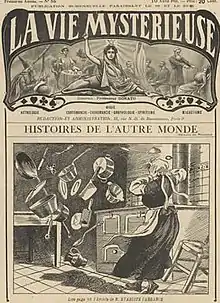دورجنبی
دورجُنبی یا دورجابهجایی یا سایکوکینسیس یا تلکنسیس (به انگلیسی: psychokinesis یا telekinesis)[2] در فراروانشناسی، یک توانایی روحی ادعا شدهاست که به فرد امکان میدهد بدون تعامل بدنی بر یک سیستم فیزیکی تائیر بگذارد. آزمایشهای دورجُنبی در طول تاریخ به دلیل عدم کنترل مناسب و تکرار پذیری مورد انتقاد قرار گرفتهاست.[3][4][5][6] هیچ مدرک اثبات شدهای وجود ندارد که نشان دهد دورجُنبی یک پدیده واقعی است و موضوع بهطور کلی به عنوان شبه علم در نظر گرفته میشود.[3][7][8][9]

تجسم یک هنرمند از مفهوم دورجُنبی، در یک نقاشی از سال ۱۹۱۱ که در مجلهٔ فرانسویزبانِ زندگی اسرارآمیز[1] چاپ شدهاست.
ریشهشناسی واژهٔ «سایکوکینِسیس»
واژهٔ «سایکوکینِسیس» را نویسندهای آمریکایی به نام هنری هولت در سال ۱۹۱۴ و در کتاب خود به نام روابط کیهانی ابداع کرد. این کلمه ترکیبی از کلمههای ψυχή (در یونانی بهمعنی «روان») و κίνησις (به معنی «حرکت») است.
منابع
- La Vie Mysterieuse
- تلفظ صحیح این دو واژه در انگلیسی بهترتیب «سایکوکینِسیس» و «تِلِکینِسیس» است.
- "Psychokinesis (PK)". The Skeptic's Dictionary. 2014-01-15. Retrieved 2014-02-02.
- Girden, Edward (1962). "A review of psychokinesis (PK)". Psychological Bulletin. 59 (5): 353–388. doi:10.1037/h0048209. PMID 13898904.
- Kurtz, Paul (1985). A Skeptic's Handbook of Parapsychology. Buffalo, New York: Prometheus Books. pp. 129–146. ISBN 978-0-87975-300-9.
- Humphrey, Nicholas K. (1995). Soul Searching: Human Nature and Supernatural Belief. Chatto & Windus. pp. 160–217. ISBN 978-0-7011-5963-4.
- Bunge, Mario (1983). Treatise on Basic Philosophy: Volume 6: Epistemology & Methodology II: Understanding the World. Springer. p. 226. "Despite being several thousand years old, and having attracted a large number of researchers over the past hundred years, we owe no single firm finding to parapsychology: no hard data on telepathy, clairvoyance, precognition, or psychokinesis."
- Vyse, Stuart (2000). Believing in Magic: The Psychology of Superstition (1st ed.). Oxford: Oxford University Press. p. 129. ISBN 978-0-19-513634-0. Retrieved 11 December 2015.
[M]ost scientists, both psychologists and physicists, agree that it has yet to be convincingly demonstrated.
- Sternberg, Robert J.; Roediger III, Henry J.; Halpern, Diane F. (2007). Critical Thinking in Psychology (1st ed.). Cambridge: Cambridge University Press. pp. 216–231. ISBN 978-0-521-60834-3. Retrieved 11 December 2015.
This article is issued from Wikipedia. The text is licensed under Creative Commons - Attribution - Sharealike. Additional terms may apply for the media files.
